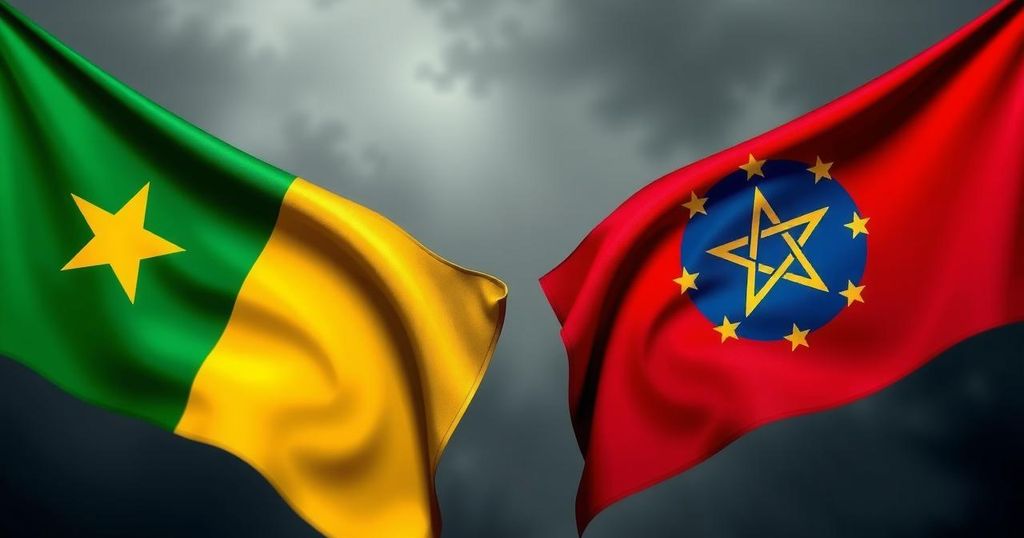Somalia has escalated tensions with Ethiopia by expelling a senior diplomat, accusing him of violating diplomatic norms and interfering in its internal affairs. This follows similar past events and comes at a time when Ethiopia has formed controversial agreements with semi-autonomous Somali regions. In response, Somalia is strengthening ties with Egypt and Turkey, who are engaged in counterbalancing Ethiopia’s influence. The situation poses significant implications for regional stability.
The tensions between Somalia and Ethiopia have escalated significantly following the recent expulsion of a senior Ethiopian diplomat from Somalia. On Tuesday, Somalia’s Foreign Ministry ordered Ali Mohamed Adan, a counselor at Ethiopia’s embassy in Mogadishu, to depart the country within 72 hours due to alleged interference in Somalia’s internal affairs. Somalia’s government accused Mr. Adan of actions deemed incompatible with his diplomatic role, which they stated violated the Vienna Convention on Diplomatic Relations by not respecting the host nation’s laws and meddling in its domestic matters. This incident follows a troubling pattern in diplomatic relations, as Somalia had expelled Ethiopia’s ambassador in early April, amid similar accusations of Ethiopia encroaching on Somalia’s sovereignty. The backdrop for these tensions includes Ethiopia’s recent agreements with Puntland, a semiautonomous region in Somalia, and Somaliland, an unrecognized breakaway territory. In an agreement with Puntland, Ethiopia sought to enhance its ties, shortly after Puntland ceased recognition of the Somali federal government’s authority due to constitutional changes. Additionally, in January, Ethiopia reached an arrangement with Somaliland to gain military and commercial access to its coast in exchange for potential recognition of the region, which has drawn ire from Somalia. Following these developments, Somalia has sought to bolster its security cooperation with Egypt and Turkey, two regional powers with vested interests in opposing Ethiopia. Egypt, facing its long-standing disputes regarding the Grand Ethiopian Renaissance Dam (GERD), has signed a defense pact with Somalia and provided military support. Meanwhile, Turkey has increased its military engagement in Somalia, enhancing their presence amid rising tensions. In August, Turkey also facilitated an indirect reconciliation meeting in Ankara between Somalia and Ethiopia, although follow-up discussions have not progressed. As these dynamics unfold, the broader implications for regional stability and inter-state relations in the Horn of Africa remain critical.
The relationship between Somalia and Ethiopia has historically been complex, characterized by both cooperation and tension. The recent diplomatic strife stems from accusations by Somalia that Ethiopia is interfering in its internal affairs, particularly relating to the regional autonomy movements within Somalia. Both Puntland and Somaliland have pursued closer ties with Ethiopia, which has raised concerns within the Somali government about the potential fragmentation of its authority and sovereignty. The involvement of external powers, such as Turkey and Egypt, also complicates the situation as they seek to protect their interests in the region and counter Ethiopia’s influence.
The tensions between Somalia and Ethiopia underscore the fragility of diplomatic relations in the Horn of Africa. The expulsion of a senior Ethiopian diplomat signals a deepening rift, particularly amid Ethiopia’s growing alliances with Somali regions that challenge the federal authority. With external powers such as Turkey and Egypt supporting Somalia amidst these conflicts, the dynamics of regional politics may witness further evolutions, posing potential challenges to stability in the region.
Original Source: www.al-monitor.com







